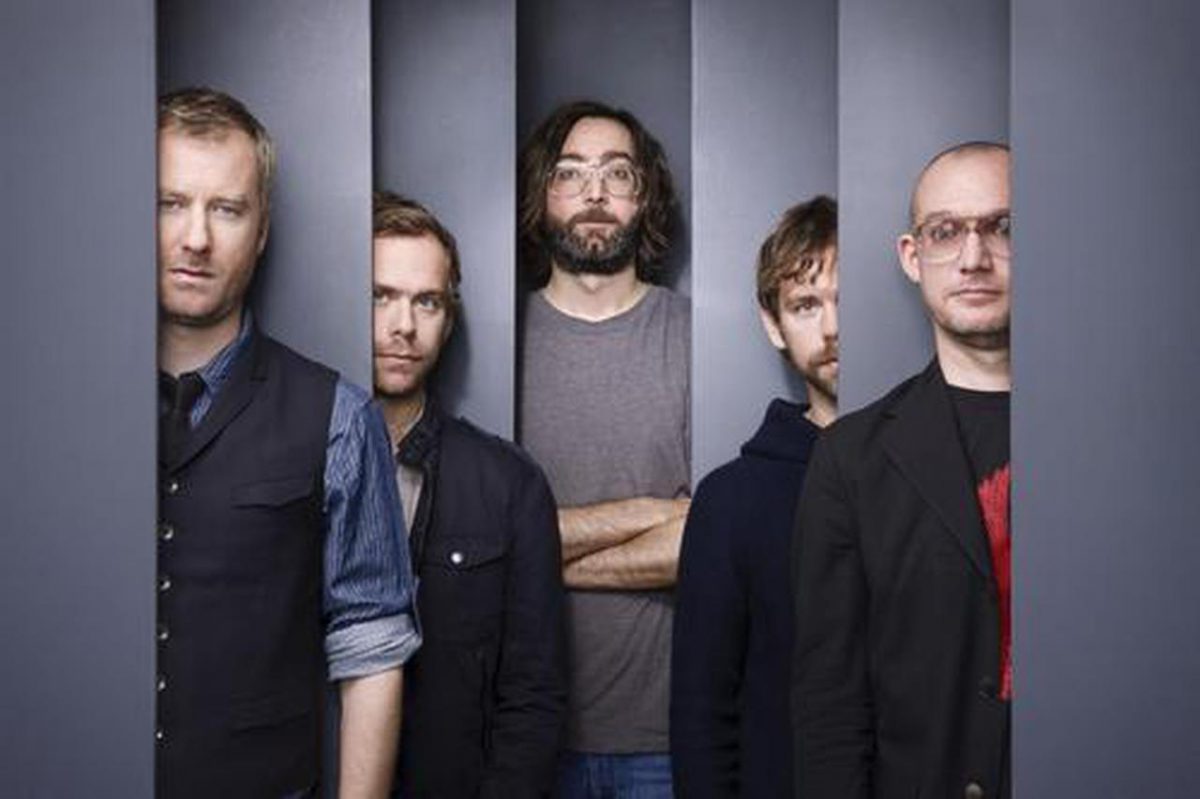Interview: The National brings dark sound to Treasure Island Music Fest

The National, courtesy.
This story originally appeared in the Oakland Tribune.
Why are the men of the now-soaring Brooklyn quintet The National so sad? Maybe it’s because their fans want them to be.
Treasure Island Music Festival, with LCD Soundsystem, Belle & Sebastian, the National, more
12 p.m., Oct 16-17
Treasure Island; free parking at AT&T Park, with shuttle to the island. No parking on the island.
Tickets: $68-$120.
Singer Matt Berninger, twin guitarists Aaron and Bryce Dessner and brothers Bryan (drums) and Scott Devendorf (bass) are really normal, cheerful guys. They joke with each other, get along like a family and have fun recording and performing their songs.
Yet the band, which plays the second day of the Treasure Island Music Festival on Oct. 17, is known for moody, dark and haunting melodies about love lost and trust broken – a la Joy Division.
“In some ways, we are opposite of what the songs are about,” said Scott Devendorf in a recent phone conversation. “On a day-to-day basis, we’re not on any prescription medications.”
Upside of dark
Still, Devendorf said, fans of the National should not expect any happy pop songs anytime soon.
“Well, will (fans) want it? I don’t know,” he said. “It seems like people seem to gravitate toward the band partly because of the dark nature of it.”
Success is coming quickly for the National. Its newest album, “High Violet,” debuted at No. 3 on the Billboard Top 200 Chart when it was released in May. It earned praise not just from music publications but from the New York Times and Newsweek.
But this is far from an overnight success story. The band has been around since 1999 and “High Violet” is its fifth album.
Berninger met Devendorf in 1991 while both studied graphic design at the University of Cincinnati. They briefly formed a band, which broke up as they moved to New York looking for work. Both worked in the industry for five years.
In 1999 Devendorf invited his brother, a copy editor at a small literary press, when the two needed a drummer. Bryan Devendorf, in turn, invited his friends the Dessner twins, also native Ohioans. Devendorf describes the twins as standout soccer players, and Bryce as a classically trained guitarist fluent in French.
From the outset the band’s calling card was Berninger’s baritone voice, recalling Leonard Cohen, Nick Cave and the late Ian Curtis of Joy Division. Many of the songs, written primarily by Berninger, are about broken relationships and isolation.
“They’re stories that are partly narrative, partly autobiographical,” Devendorf said. “(They’re) partially based on personal experience, partially on characters trying to solve stuff.”
Wrong turn
After self-releasing its first two albums, a self-titled debut in 2001 and 2003’s “Sad Songs for Dirty Lovers,” the band signed to an indie record label to release its third, 2005’s “Alligator.” The album exposed the band to critics who began to pile on praise.
But the band members were still doing much of the work, including driving a van across America and Europe.
As Devendorf recalls it, the five could have died one day a few years back as they embarked on a drive from Italy into France in winter.
“We decided to take a side route, which seemed like a very straight road from the Michelin guide map, but it turned out to be a treacherous mountain pass through literally 10 feet of snow above the tree line,” he said. “It took us about six hours longer than we thought it would, and we were the only car on the road for three hours.”
Signature sound
For the fourth album, the 2007 critical breakout “Boxer,” the National unexpectedly changed directions from visceral rock to down-tempo balladry; which has become the band’s signature sound.
Devendorf said he and his bandmates went into the studio to make something different.
“Everyone expected us to make a more screamy, loud record – another ‘Alligator,’ effectively,” he said. “We didn’t really want to do that so much. We were exploring more piano sort of songs and more orchestral sounds, so I think those made their way into it.
“And when we were done with that, we were like, ‘we don’t want to do that again,’ so that’s how we ended up with ‘High Violet.’”
The success from “Boxer” gave the band the ability to record what it wanted its new album to be. The band planned for the new album to be a happier-sounding record than its previous work. It just didn’t turn out that way.
“Maybe we’ll try again next time to be cheerful,” Devendorf said.
Follow editor Roman Gokhman at Twitter.com/RomiTheWriter.
